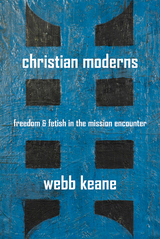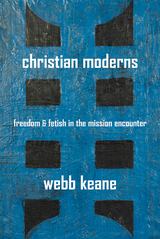I argue that the moral narrative of modernity is a projection onto chronological time of a view of human moral…
Christian Moderns

Religious faith in the transcendent cannot help but be expressed through material forms and representations, in what Webb Keane calls a “semiotic ideology”. All worship, even the worship a God so trancendent he cannot be named or represented in images, has to be materialized through human, and therefore social, media of expression. This means it can never attain a condition sufficiently abstract or spiritual nor wholly spontaneous and sincere, consequently leading faiths to bouts of “purification.”
Using the missionary encounter between the morally rigorous Calvinism and marapu, an indigenous ancestor practice with elaborate materialization from Sumba, an island of eastern Indonesia, Webb Keane details the semiotic drama in Christian Moderns. Through a century long ethnographic study—beginning with colonial Dutch East Indies to independent Indonesia—Keane explores language, modernity and morality through the analysis of the “smallest capillaries of everyday life.”
After purification
Christian Moderns stands apart in at least two respects: in method and in conceptualization. Whereas earlier works on liberalism, modernism…
Speech and space
Like Webb Keane, I have come to see some metapragmatic elements in evangelical culture as bringing about some important and…
An absence of belief?
The topic I want to pester Professor Keane about is belief. Christian Moderns uses the missionary encounter on the Indonesian…
Colonialism and conflict
If the idea of purification is to retain broad currency across the colonial landscape, it may need to be defined…
No view from nowhere
I’ll start with a comment about my own angle of approach. There is of course no view from nowhere, and…
Reconstructing belief
I would like to continue the discussion of modernity and the problem of belief, which, like Danilyn Rutherford, I do…
Giving up the Holy Ghost
Keane’s account is convincing, but it is important to contextualize the semiotic ideology he defines. I could be misreading Keane…












